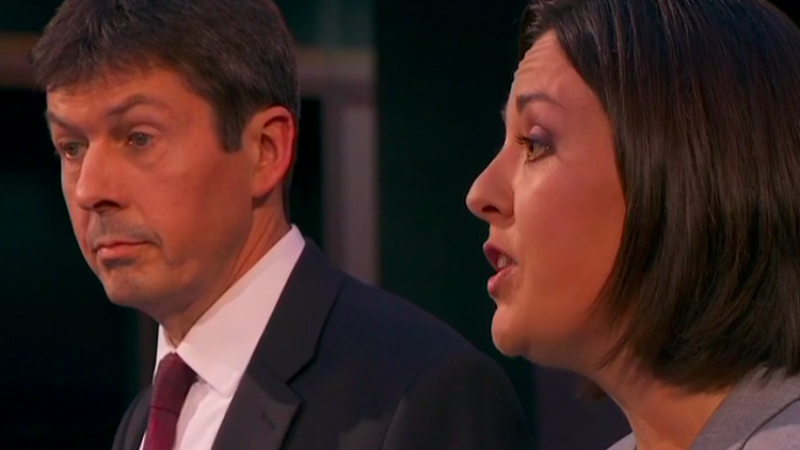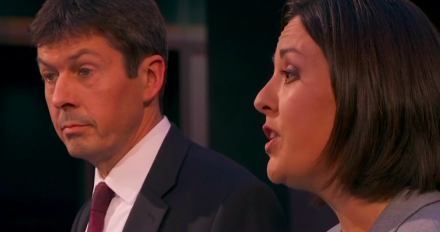

An invited audience of current and former Labour supporters heard Kezia Dugdale and Ken Macintosh present their vision for the future as they went head to head in a BBC Scotland televised debate last night.
In trying to regain any semblance of credibility and optimism about the future both Scottish leadership candidates set about trying to address the problem of the electorate not knowing what the Labour Party now stands for.
Dugdale offered a future with ambition rooted in the values of the Labour Party that gave the country the NHS, the Welfare State and the national minimum wage. She said she was “proud of the past but didn’t want to live in it” and wanted to lead the Party back into power.
Macintosh put himself forward as the candidate of change who wants to break up the Party machine, and put the ordinary membership back in charge to transform the Labour Party, its policies and strategy, with a Chief Executive Officer at the helm.
Both said they felt it a mistake for the Westminster Parliamentary Party to abstain in the recent vote on the Tory welfare reforms and would have voted against the bill. Kezia Dugdale thought a stand had to be made and each expressed anger and disappointment with the Westminster leadership.
An ex-Labour now SNP voter raised the spectre of the Red Tory which is still very much alive and kicking at the Labour Party and is one of the more serious charges requiring the new leader to address. Macintosh said he wanted to use all the powers at the disposal of Holyrood to work towards ending austerity and gave three examples where this could be done, including extending free school meals, building more houses and focusing on improving attainment in schools. Dugdale pointed out that during the eight years of SNP administration there had been no change in the gap between the richest and poorest child in the country and while serving in local government she had worked with the SNP in promoting progressive policies.
A lively exchange on the level of the Living Wage revealed how this could turn out to be one of those thorny issues where the seeds of a self-inflicted problem could materialise in the future. A question from the audience asked whether in a devolved future there could be differences in the rate across the UK, and even between cities. Neither candidate wanted to see competition between regions and emphasised that there should be no race to the bottom, with a level playing field being maintained where devolved powers could be used to increase the minimum wage to a level above the rest of the country.
The idea of a separate Scottish Labour Party was emphatically rejected by both, there was little point in campaigning to pool and share resources across the UK, while saying something different in respect to the constitution of the Party. Each felt there was no threat to the autonomy of the Scottish Party within the UK organisation.
Macintosh’s radical plan for restructuring the Party was matched with Dugdale’s wish to have the Party back in the control of ordinary members where policy decisions were fed through constituencies with an end to the Policy Forums.
A rumbling thread throughout this debate was highlighted when each candidate was asked who they supported for the national leadership. While neither wished to commit to any particular individual, they stressed they could work with whoever was elected. The audience was less reticent. One contributor had initially intended voting for Andy Burnham but felt those who abstained on the Welfare bill showed a lack of leadership and subsequently switched allegiance to Jeremy Corbyn. A view was also expressed that the Party will only win from the centre.
This was a debate devoid of the rancour which has developed in the national leadership contest, showing up two contenders who are intent on listening carefully to what has been said through the ballot box and on the doorsteps across Scotland. The differences between them are marginal with both firmly grounded in traditional Labour values, in the pursuit of social justice. It could be useful if each were to expand on their ideas for restructuring the machinery and policy making process and how this would give ownership and empowerment back to the grass roots membership so their aspirations are fully met as they prepare to campaign for the Holyrood elections in 2016 and the local council elections a year later.
You can watch the half hour debate on BBC iPlayer here for the next month.




More from LabourList
‘Why solidarity with Ukraine still matters’
‘Ukraine is Europe’s frontier – and Labour must stay resolute in its defence’
Vast majority of Labour members back defence spending boost and NATO membership – poll